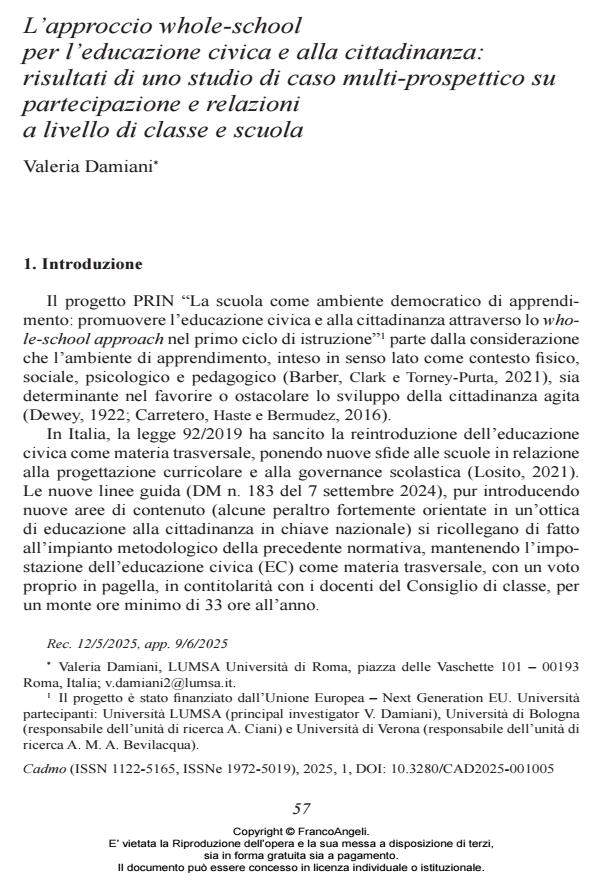L’approccio whole-school per l’educazione civica e alla cittadinanza: risultati di uno studio di caso multi-prospettico su partecipazione e relazioni a livello di classe e scuola
Titolo Rivista CADMO
Autori/Curatori Valeria Damiani
Anno di pubblicazione 2025 Fascicolo 2025/1
Lingua Italiano Numero pagine 25 P. 57-81 Dimensione file 263 KB
DOI 10.3280/CAD2025-001005
Il DOI è il codice a barre della proprietà intellettuale: per saperne di più
clicca qui
Qui sotto puoi vedere in anteprima la prima pagina di questo articolo.
Se questo articolo ti interessa, lo puoi acquistare (e scaricare in formato pdf) seguendo le facili indicazioni per acquistare il download credit. Acquista Download Credits per scaricare questo Articolo in formato PDF

FrancoAngeli è membro della Publishers International Linking Association, Inc (PILA)associazione indipendente e non profit per facilitare (attraverso i servizi tecnologici implementati da CrossRef.org) l’accesso degli studiosi ai contenuti digitali nelle pubblicazioni professionali e scientifiche
The PRIN project “The school as a democratic learning environment: promoting civic and citizenship education through the whole-school approach” aimed to analyse the different dimensions of the wholeschool approach at classroom, school levels and in relation with the local community. This paper presents the results concerning two WSA dimensions, namely student participation in class and at school and teacher-student relations (the classroom climate). These dimensions were investigated through a case study conducted in one primary and lower secondary school in Rome. The research adopted different tools such as questionnaires, interviews and focus groups. Data were analysed to show the multiperspective character of the research, examining in synergy the point of view of the school head, the teacher coordinating civic education at school, the teachers and the students. The analysis of the data made it possible to highlight key practices and implicit assumptions that characterise the dimensions of the WSA relating to participation and classroom climate. Specifically, findings showed a discrepancy between teachers’ perceptions of participation at class and school level, compared to students’ perceptions, and a different way of understanding student involvement by primary and lower secondary school teachers. The contribution closes with some insights on further research and training interventions with schools and teachers.
Parole chiave:civic and citizenship education, wholeschool approach, Italy, primary school, lower secondary school
Valeria Damiani, L’approccio whole-school per l’educazione civica e alla cittadinanza: risultati di uno studio di caso multi-prospettico su partecipazione e relazioni a livello di classe e scuola in "CADMO" 1/2025, pp 57-81, DOI: 10.3280/CAD2025-001005